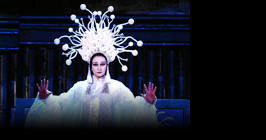
13-14 March 2009 ▪Grant Recital Hall, 1 Young Orchard Avenue▪Brown University
| about event |
| program |
| participants |
| readings |
| Friday March 13 | ||
9:30 |
Greeting and Opening Remarks
|
Dana Gooley (Music) |
10:00-12:00 |
Theatricality and the Political Public Sphere Samuel Weber observes in Theatricality as Medium that “of all the ‘arts,’ theater most resembles politics insofar as traditionally it has been understood to involve the assemblage of people in a shared space.” It is obvious that theatricality is perpetually mobilized by its practitioners, sometimes self-consciously, to advocate for political causes and to harness political consensus, and that audiences are willing to respond in appropriately “theatrical” ways. Yet this embrace of theatricality apparently stands in tension with the ideal of political culture as a space of transparent, rational discussion and debate, which would seem to demand a suppression of theatrical means. Panelists will address how this tension is played out in various historical and political contexts.
|
|
1:30 - 3:30 |
Early Modern Theatricalities While western conceptions of theatricality are often traced back to foundational statements and attitudes found in Plato and Aristotle, it is clearly a historically variable concept whose modern history has been shaped decisively by Enlightenment thought. Theatricality problematizes the Enlightenment model of representation in which communicative symbols are ontologically and functionally separate from the meanings or objects they convey. This panel examines configurations of the theatrical in writing, architecture and scientific demonstrations from the early modern period to illuminate other logics of theatrical meaning and signification.
|
|
3:45-4:45 |
KEYNOTE
|
Helmar Schramm (FU) |
Saturday March 14 |
||
9:00-11:00 |
Operatic Frames This panel concentrates on opera's multiple frames -- be they medial (live telecast, DVD, etc.) or socio-historical (instances of festivity and celebration). Opera was often closely tied to court festivity from its origins, but the genre’s popularization and commercialization effectively concealed the festival function with “entertainment.” The opera festival, as exemplified by Wagner’s Bayreuth and later Salzburg, has historically striven to reinvest operatic experience with a sense of higher festivity and social relevance. This strand of presentationa politics has been cross-cut by another, arguably even more far-reaching development. Over the course of the past 30 years or so, opera's entertainment function has shifted markedly to encompass a whole new range of medial forms and expressive vocabularies. How do these various frameworks (including opera's medial conditions and its festival frameworks) come to reshape meaning and influence conditions of spectatorship?
|
|
11:15-12:30 |
KEYNOTE
|
Gabriele Brandstetter (FU) |
2:00-4:00 |
Virtual Theatricalities In his book Theatricality as Medium Samuel Weber poses the question “how does it come about ... that, in an age increasingly dominated by electronic media, notions and practices that could be called ‘theatrical,’ far from appearing merely obsolete, seem to gain in importance?” The significant medial differences that seem to remove digital environments and communicative forms from theatrical situations, in other words, has not necessarily given rise to radically new forms but to a reinscription of theatricality within the new media. This panel explores various examples of this tension between the potentially “new” and the theatrical as represented in digital game environments, music video, opera and film.
|
|
4:15-5:15 |
PLENARY DISCUSSION
|
|